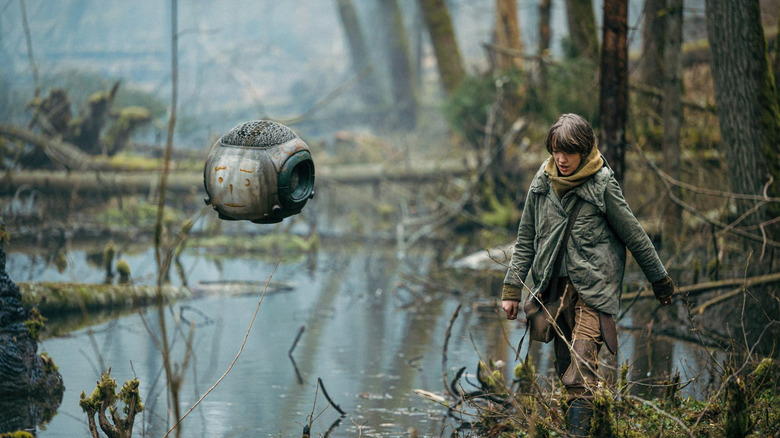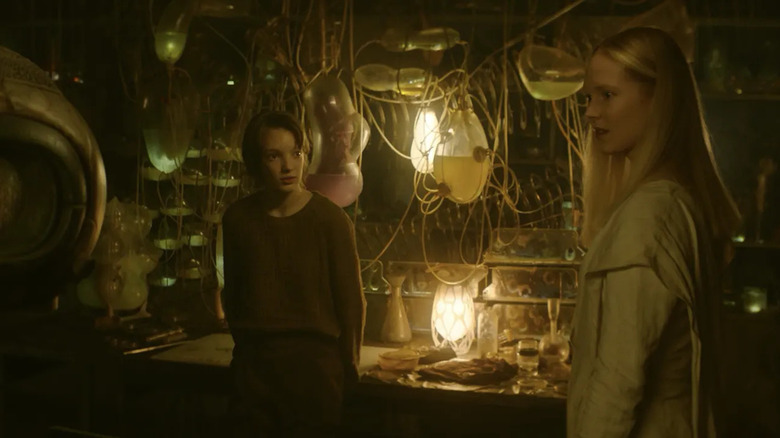Vesper Review: A Beautifully Hopeful Take On Sci-Fi Dystopias [Fantastic Fest]
Filmmaking duo Kristina Buožytė and Bruno Samper ("Vanishing Waves") return after eight hard-fought years with "Vesper," a high-concept science fiction odyssey executed without studio millions. Buožytė and Samper decided, after a few years of English-language projects that never came to fruition, they should return to their independent roots. "Vesper" bursts with worldbuilding ambition, made possible by strategically shooting in Lithuania on private investments. Buožytė and Samper's fantastical dystopia reminds us of the interplanetary visuals Zeek Earl and Chris Caldwell nurtured in "Prospect;" both films imagineer tremendous genre universes without a major studio budget.
Raffiella Chapman stars as nomad Vesper, an intelligent girl living with her bedridden father (played by Richard Brake) during the "New Dark Ages." Humanity tried to prevent an impending ecological crisis with genetic technology, failed, then eradicated edible plants, wildlife, and large population numbers. A new oligarchy now rules from protected "Citadels," while common folk like Vesper rely on coded seeds from Citadels with only one harvest. Vesper spends her time attempting to cure her father — who can communicate through and accompany his daughter using a hovering circular robot — while bartering with frenemy Jonas (Eddie Marsan). Then a Citadel ship crashes near both their properties, which causes tension when Vesper and Jonas have different ideas on what to do with survivor Camellia (Rosy McEwen).
Watching "Vesper" makes the noticeable gap in Buožytė and Samper's timeline so frustrating because their directorial instincts are flush with creative juices that soak into locations, concepts, and cinematic DNA. There's nothing ordinary about "Vesper," nor their last project, "K is for Knell" as seen in the kill-per-segment horror anthology "The ABCs of Death 2." There are expensively priced mainstream sci-fi flicks that wish they plucked even a feather of the peacocking that Buožytė and Samper display, at the very least on a visual level.
Hope in ungovernable times
"Vesper" opens as the title protagonist leads viewers over barren plains, around long-abandoned refineries, and past overgrown foliage that is something from another world. Cinematographer Feliksas Abrukauskas doesn't shy away from tentacled plants that pop from mini holes behind Vesper like prairie dogs and holds firm on digital effects (possibly practical as well, since nothing is shot on green screens) that breathe vitality into vegetation befitting wizarding or Seussical worlds.
Buožytė and Samper are confident in their eco-apocalypse commentary and civilization takedowns, which still equate to a message of hope in ungovernable times. "Vesper" is a film that relies on needle-shooting shrubs and a mechanical version of Wilson from "Castaway" that sell every last fantasy element, which are the crown jewels shared by the film's directors. There's belief in what's sold — from pasty test-tube entities to landscape ingenuity — which allows audiences to find themselves tangled in lushness from another dimension.
Consequently, "Vesper" can also narratively drag its feet at times. Chapman does well commanding the screen as a junior explorer in unprecedented times, and Eddie Marsan does right as a dystopian curmudgeon who executes artificial beings without second thoughts. It's more about the outdoorsy lulls where Vesper meanders across mossy woodlands or relies on seedling data code hacking as storytelling tension. Rosy McEwen and Chapman share impactful scenes dealing with interconnected papa dramas, yet there's still an airlessness to a couple of their lost-from-humanity interactions. Buožytė and Samper find themselves caught in the obscure thickets of their vaguely "Hunger Games" fairy tale, which can be an imposition. There's a quietness that whispers danger, but which doesn't resonate as drearily as it should.
Then again, "Vesper" is a movie about hope even in the bleakest realities. Kristina Buožytė and Bruno Samper don't need that hope to assert their proficiency as filmmakers. There's more imaginative cultivation in a single flower petal along Vesper's trail than in countless major theatrical releases. There's no argument against squishy cell-based special effects or unexpected greenhouse species. "Vesper" mightily succeeds as an ode to raw abilities, but Buožytė and Samper's methods can at times trudge through the mud. Nonetheless, their first feature since a literal decade ago proves why these magnificent mavens of make-believe should be on everyone's radar — studios should jump in line to make sure it's not another ten years before we're graced with their signatures.

